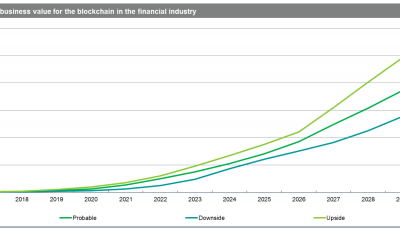Linux Foundation gets corporate giants’ vows for blockchain promotion
![]() The Linux Foundation, the nonprofit organization enabling mass innovation through open source, has announced a new collaborative effort that unites the world’s corporate giants to advance the avant-garde blockchain technology.
The Linux Foundation, the nonprofit organization enabling mass innovation through open source, has announced a new collaborative effort that unites the world’s corporate giants to advance the avant-garde blockchain technology.
The Linux Foundation describes itself as the organization of choice for the world’s top companies and developers to construct ecosystems that speed up open technology development and commercial adoption. It says that together with the global open source community, it is solving the hardest technology problems by forming the largest shared technology investment in history. The foundation, founded in 2000, offers tools, training and events to scale any open source project, with the offerings together delivering an economic impact not achievable by any one company.
The foundation said in an email forwarded to CoinReport by Innovate Finance that it has received early commitments for the Open Ledger Project from:
- ANZ Bank
- Cisco
- CLS
- Credits
- Digital Asset Holdings
- Fujitsu
- IC3
- IBM
- Intel
- London Stock Exchange Group
- Mitsubishi UFJ Financial Group (MFUG)
- State Street
- SWIFT
- VMware
- Wells Fargo
The project will develop an enterprise grade, open source distributed ledger framework and enable developers to concentrate on creating robust, industry-specific applications, platforms and hardware systems to support business transactions.
Considerable research and development efforts by many of the founding members are already being devoted to explore blockchain applications for industry. The Linux Foundation named two enterprises in this regard: IBM and Digital Asset Holdings
The foundation said that IBM intends to contribute tens of thousands of lines of its present codebase and its corresponding intellectual property to this open source community, while Digital Asset Holdings is lending the distinguished Hyperledger name to the project, which will be employed for future branding of this effort, as well as enterprise grade code and developer resources.
Formation and Technical Steering Committees will, said the foundation, exhaustively review all these contributions, and others that are planned from a variety of companies, in the weeks to come.
Blockchain is a digital technology for recording and verifying transactions, but one that serves as a distributed/decentralized ledger. It is a permanent, secure tool that makes it easier to build cost-efficient business networks without necessitating a centralized point of control. Virtually anything of value can be tracked and traded on distributed ledgers. In the enterprise world, the application of this emerging technology is showing great promise, said the foundation, giving examples that it allows securities to be settled in minutes instead of days and companies can use it to manage the flow of goods and related payments more effectively or manufacturers can share production logs with OEMs and regulators to reduce product recalls more efficiently.
“Distributed ledgers are poised to transform a wide range of industries from banking and shipping to the Internet of Things, among others,” said Jim Zemlin, executive director at The Linux Foundation, in the email. “As with any early-stage, highly-complex technology that demonstrates the ability to change the way we live our lives and conduct business, blockchain demands a cross-industry, open source collaboration to advance the technology for all.”
The Linux Foundation said in the email that distributed ledger systems are being built in several industries, but to realize the promise of this new technology an open source and joint development strategy that supports multiple players in multiple industries is required. This development combined with the Hyperledger brand can, said the foundation, enable blockchain technology’s adoption at a pace and depth not achievable by any one company or industry. According to the foundation, this type of shared or external research and development has proven to deliver billions in economic value.
The foundation expects that this collaboration will help ascertain and address main features and presently missing requirements for a cross-industry open standard for distributed ledgers that can change the way business transactions are conducted around the world.
In its email, The Linux Foundation also shared comments from officials of the corporations listed above on this occasion.
The comments:
ANZ Bank
ANZ CTO Patrick Maes said, “We are pleased to confirm our participation in the open ledger project as we recognise that there is currently no industry accepted, enterprise-grade blockchain framework today that is fit for purpose for our industry. Our objectives around blockchain initiatives are that we will seek to learn, explore and contribute to the development of a global framework with our ecosystem partners, and ANZ is uniquely placed in this regard since we operate in 34 markets.”
Nigel Dobson, ANZ’s general manager of payments transformation, said he sees involvement with the project as an opportunity to explore and contribute to real-world, bank-grade applications of the technology and wider frameworks. “I see significant potential opportunities in the future to improve our customer experience and potentially deliver productivity gains by solving real business challenges, with initial use cases in payments and particularly correspondent banking.”
CLS
“CLS is pleased to participate in this broad industry-wide effort to standardize and advance Distributed Ledger Technology,” said David Puth, CEO of CLS. “A common DLT platform on which product specific solutions can be built is key to the successful adoption of this technology.”
Credits
“Distributed Ledger Technology is quickly becoming the most exciting industry to help build out,” said Credits CEO and founder Nick Williamson. “It’s initiatives like the open ledger project that will help cut through the noise stemming from the hype cycle and start bringing substance to this nascent industry.”
Digital Asset Holdings
“We are delighted that the Linux Foundation is providing a broadly-supported vehicle through which we can contribute the Hyperledger brand, and enterprise grade blockchain solutions to the open source community,” said Blythe Masters, CEO of Digital Asset Holdings. “The resulting impetus will benefit our clients and the entire global financial services industry who are seeking to build business applications on a trusted foundation.”
IC3
“IC3 – Initiative for CryptoCurrencies and Contracts – is delighted to be a part of this initiative and bring the strengths of its team of academic researchers—rigorous security analysis, expertise in distributed systems and cutting-edge cryptography, and an interdisciplinary perspective—to this vibrant new community.” — Ari Juels, Jacobs Institute, Cornell Tech; Andrew Miller, Univ. of Maryland; Elaine Shi, Cornell University; and Gun Sirer, Cornell University.
IBM
“A broad, cross-industry and open source approach is critical to advance the potential for blockchain and make it mainstream,” said Arvind Krishna, senior vice president and director, IBM Research. “Even beyond building out standards, creating common code will allow organizations to focus on creating industry-specific applications that enhance the value of this technology.”
Intel
“Open source software is very well suited to be the basis of highly-complex technologies that require secure transactions,” said Imad Sousou, vice president and general manager, Open Source Technology Center, Intel Corporation. “The open ledger project can help enable the industry to focus on a shared infrastructure to help create value and impactful innovation.”
London Stock Exchange Group
Moiz Kohari, group head of technology innovation, London Stock Exchange Group, said, “LSEG is committed to an open source collaborative approach to the development of the building blocks for blockchain technology. We believe this technology has the potential to drive change across the industry but will need to be developed in partnership with clients and other industry participants under an open source approach. This needs to be done in a considered and rigorous manner to benefit the market as a whole.”
Mitsubishi UFJ Financial Group (MFUG)
“The evolution of information and communication technology including blockchain is the origin of new market creation,” said Satoshi Murabayashi, senior managing executive officer and Group CIO, MUFG. “The new product and services supported by open innovation platform is key factor for Japan and world economy. MUFG supports this project for creating innovative financial services.”
State Street
“Advancement in distributed ledgers can provide tremendous evolutionary opportunities in financial services, and drive new opportunities and efficiencies in institutional investing,” said Antoine Shagoury, global chief information officer at State Street. “The work the open ledger project is focused on is an important first step as coordinating open standards will help this technology achieve the critical mass it needs.”
SWIFT
“SWIFT is delighted to support this industry-wide effort to advance distributed ledger technology,” said Craig Young, SWIFT’s chief technology officer. “Cooperation and collaboration – hallmarks of the SWIFT cooperative – will be key to ensuring the scalability and adoption of this technology.”
Image courtesy of The Linux Foundation

![[Guest Post] Breaking Down Barriers with The Next Generation of DApps](https://coinreport.net/wp-content/uploads/2019/06/Jimmy-Zhong-CEO-of-IOST-400x230.jpg)










